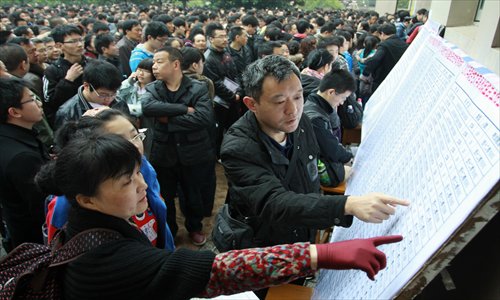Tarnished halls

Parents check the score board in March after independently held college entrance exams in Wuhan, Central China's Hubei Province. Photo: IC
The ivory towers of universities might seem like a refuge from the woes of the world, and, in China, from rampant corruption. But the recent detention of a senior university official has tarnished the image of the campus. Cai Rongsheng, 48, head of the admissions office of the Renmin University of China (RUC), is under investigation for taking bribes, reports said.
Yet Cai is just one of many college officials brought down for corruption. The public is wondering: Are schools places of learning, or are they about turning a buck?
Pay to study
Cai, who took the charge of student enrollment, was detained when trying to use a fake passport to flee abroad from Shenzhen airport in Guangdong Province, the Beijing-based Legal Mirror reported on November 27.
The university did not detail the reasons of Cai's detention, and nor did the Ministry of Education. Media outlets, such as Legal Mirror, have said that Cai is linked to large-scale corruption cases involving bribes in return for enrolling particular students.
The China Youth Daily reported Saturday that the RUC has required its senior officials to hand in their passports following Cai's detention and insiders at the university said that more people involved in the case will be probed.
An inspection team of the Communist Party of China's Central Committee for Discipline Inspection carried out an inspection tour in the RUC from June to August in 2013. The team has found loopholes in the university's "independent" student enrollment and other aspects, according to a report on the anti-corruption watchdog's website.
The RUC is one of more than 100 universities allowed to use its own criteria as part of student enrollment, rather than relying solely upon the results of the national college entrance examination, or gaokao.
The Ministry of Education has asked the university to cooperate with the investigation, said Xu Mei, spokesperson of the ministry, adding that the department demands a transparent admissions system.
Cai was a professor in economics in the university and was fulsomely praised on the RUC website. He also held concurrent positions on the board of at least seven corporations, Caixin magazine reported.
An anonymous staff member from the RUC told the China Youth Daily that Cai was a show-off and often drove a BMW on campus. The media has reported that many online posts since 2010 have accused Cai of taking advantage of the independent enrollment system to take bribes.
Cai is not the first university official toppled for taking bribes in return for offering places.
In 2010, Yu Xingchang, vice head of the education department of Jilin Province, was sentenced to life imprisonment on charges of accepting 8.02 million yuan ($1.31 million) of bribery in exchange for helping unqualified students get admitted.
Administrators' power
The independent enrollment system has been criticized as a potential hotbed for corruption, due to the lack of transparency and supervision.
The system, which was established by the central government in 2003, allows certain universities to recruit students using their own standards, such as by artistic or sporting evaluation.
Students with artistic or sporting talent can be admitted with a gaokao grade for at least 20 points lower than ordinary students. The standards of acceptance are supposed to be tightly controlled by the university's admissions department and university leaders.
Nevertheless, some officials used the system to make money or to trade favors to win promotion, which made the system a tool for the privileged of the powerful, the Beijing Morning Post reported. China's universities are known to be top-heavy with non-academic administrators.
The Beijing Morning Post quoted an anonymous source from a university in East China on Tuesday as saying that places at the university this year can be priced as high as 1 million yuan thanks to the decreasing number of places available.
An official at a major university told the Beijing Morning Post that some high-ranking officials had "requested" the school recruit unqualified students and the independent enrollment system was the only way to meet their demand.
The system has become a "green channel" for untalented students who have strong official connections to get into good universities, the newspaper reported.
Xiong Bingqi, an education expert and vice president of the 21st Century Education Research Institute, told the China Youth Daily that corruption is unsurprising given the lack of supervision.
"Although the Ministry of Education released a circular demanding disclosure of information from higher education in 2010, it didn't specify what kind of information and how it should be disclosed," Xiong said.
The China Youth Daily also reported that corruption exists in postgraduate admissions, where universities have considerably more discretion over whom to admit than at the undergraduate level.
Cleaning up campus
Experts, however, believe that the corruption in China's universities is caused by centralized administrative management.
Yang Yusheng, a law professor from the China University of Political Science and Law, told the Legal Weekly that the centralized administrative management lacks transparency and supervision from the public.
Chu Zhaohui, a research fellow from the National Institute of Education Sciences, agreed with Yang. He said that the current administrative management system in China's universities allows officials rather than academics to dominate student management, which has caused various kinds of corruption. Both Yang and Chu agreed that more power needed to be given to academics, and less to administrators, in order to curb corruption.
China should also create or strengthen external university discipline watchdogs to enhance supervision and avoid any cover-ups within the internal management system of universities, Chu added.
Global Times